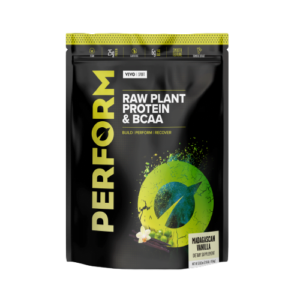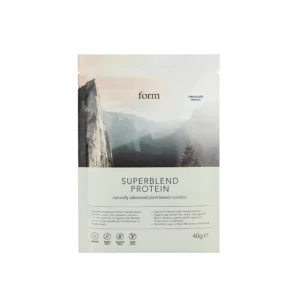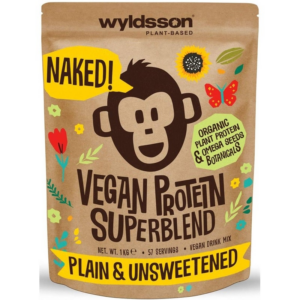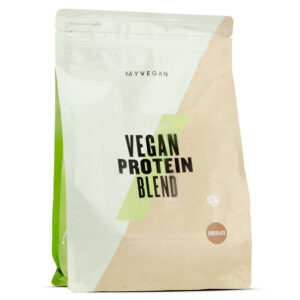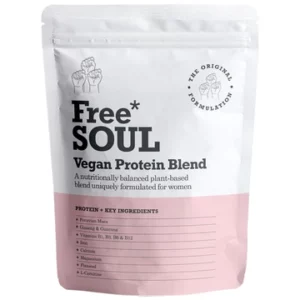For most people, a balanced whole food, plant-based diet will provide an adequate amount of protein. However, a protein powder can be an incredibly effective tool for those avid vegan lifters with higher protein requirements, or simply for those looking for a simple and effective way to ensure their daily protein requirements are met amid a busy schedule.
Whatever your needs may be, the options for vegan protein powders are almost never-ending, and finding the right one for you could be a confusing process. For that reason, we have compiled a list of the best vegan protein powders available right now.
Best Vegan Protein Powders Picks
Vivo Life is a well-established entirely vegan and carbon-neutral company that does a lot of great work for the vegan community. They aim to provide affordable, ethical, and sustainable health products without cutting corners on quality.
Their Perform Plant Protein source is a blend of Fermented Yellow Pea Protein and Cold Pressed Hemp Protein that provides a balanced profile of dietary amino acids.
Vivo Life also includes extra BCAA’s (Branched-Chain Amino Acids), which are proven to be the most beneficial amino acids in aiding muscle repair. These ingredients are also naturally dense in nutrients such as zinc and iron.
They provide a huge variety of flavors for you to choose from, and do well to avoid the chalky taste that is sometimes associated with protein powders. Their caramel flavor is our personal favorite.
Coming in at 25g of protein per serving at only 143 calories, you can be sure you are well on your way to your daily protein needs, and more importantly on your way to gains.
Other ingredients include the antioxidant turmeric which can help combat inflammation, and a digestive enzyme mix that includes black pepper and ginger to ensure the proteins are efficiently absorbed. Their product is organic and tested for heavy metals, ensuring you are not putting anything harmful in your body.
Form Nutrition is a plant-based company that is rooted in the fair treatment of the earth that provides their ingredients, and the workers that produce them. Their Superblend Protein powder is designed to be tasty enough to taste great even with just water, and we agree.
They provide a very respectable variety of flavors to choose from, with customer feedback praising the sweetness that avoids any powdery tastes.
20g of protein is delivered through a combination of organic pea protein with brown rice and pumpkin seed proteins to ensure all amino acids are equally represented, all for under 160 calories. On top of this 14 food-sourced vitamins and minerals are packed in to supplement the rest of your diet, to ensure you maintain your broader health markers rather than just protein.
Whilst protein is the main component of muscle repair, complete all round nutrition helps your body function and build muscle effectively. Form’s Superblend supplements all aspects of your nutrition.
Wyldsson’s Vegan Protein Powder is a highly versatile protein product. It is an unflavoured combination of Pea, Pumpkin & Sunflower Proteins which provides a full spectrum of amino acids, as well as a whopping 84g of protein per 100g, and an omega-grain mix of flax and chia seeds.
Being unflavored means it is the perfect choice for those looking for a protein powder to be used as an additive to other foods and recipes. We are big fans of fruit smoothies, and this product allows us to give our smoothies that extra protein and seed kick you will need after a heavy gym session. As this product is used best as an additive, it is perfect for giving your current diet a protein boost.
MyVegan’s protein powder is a fantastic choice for those who are controlling their calorie intake, so if you are looking for a high hit of protein in a low-calorie shake then this is the choice for you. A single serving of Myprotein’s vegan protein blend comes in at only 110 calories, whilst still managing to deliver 22g of protein in the form of a Pea Protein Isolate and Fava Bean Isolate bend to provide a full amino acid profile.
MyVegan provides over 15 options of flavors, meaning you are sure to find one that suits you and what you want from your protein powder. That can range from simply mixing with water for a quick protein hit after a gym session, or if you want to include this powder in your favorite recipes then an unflavored option is available.
HerFreeSoul’s protein powder is another product that supplements multiple other aspects of your diet whilst delivering the high protein hit we need for muscle building. This time, however, its micro-nutrient profile is geared towards female-specific health.
As far as protein is concerned, they use a blend of pea and hemp protein to deliver a balanced amino acid profile. They pack in 20 g of protein in each 120 calorie serving. They have four selections of flavors, and whilst this is a limited selection compared to other products, each one tastes great.
A multitude of ingredients are used in their female-specific formula. Peruvian Macca is a main ingredient, which has been observed to help promote hormonal balance during PMS and menopause, as well as help with energy levels and focus. Iron is also a key ingredient, as women are at a higher risk of developing iron deficiency due to iron being lost through blood during menstruation.
Taking a More Detailed Look Into These Protein Powders
Some of these products focus solely on providing you with a good dose of protein to supplement your current diet, whilst others have additional benefits on top of protein to further help with your health journey. Our list will help you find the best vegan protein powder to help you achieve your specific goals.
Why Would You Want to Use Protein Powder?
Protein powders are used simply to increase your daily protein intake. You may want to increase your protein intake for various reasons, but supplementing protein is usually associated with people who engage in resistance training to build muscle, as these activities increase your daily protein requirement.
Muscle Building and Recovery
Protein is essential for building and maintaining muscle mass. Engaging in resistance training to build muscle involves the breakdown and repair of muscle fibers to adapt to the resistance applied, resulting in muscle growth. Protein is composed of amino acids, and when you eat protein, these amino acids are used by the body to repair the trained muscles, which allows you to recover from resistance training and grow muscle.
Increase Protein Intake
Most people can achieve their daily protein requirements through a balanced diet. However you may desire or require a boost to your daily intake, and that’s where protein powders can help you. An increase in protein intake is usually recommended for those engaging in rigorous physical activity, and protein powder is a quick and effective way to do so.
You may also choose to use a protein powder if your regular diet is deficient in protein regardless of your levels of physical activity. Whilst this can be a great temporary solution, it is always recommended to consume as much protein as you can through whole foods. Protein powders are designed to be used as a supplement to a balanced diet.
Weight Management
People who are managing their weight may benefit from an increased protein intake for various reasons. For one it is suggested that a high protein intake can leave you satiated for longer in between meals, meaning you are less likely to overeat and gain weight.
You may also benefit from protein for weight management if you are attempting to lose fat whilst building muscle. Muscle mass will burn more calories than fat, meaning the more muscular you are the less likely you are to retain fat deposits.
Furthermore, if you are limiting your calories you may reduce your protein intake, which can have adverse results on your fitness journey. Protein powders can help you maintain your protein intake so that you can continue to retain and grow muscle.
Convenience and Versatility
For a lot of people, consuming protein powder in the form of a shake is much easier than eating more food. This could be due to either time constraints, or simply mustering the appetite. It is therefore a much more convenient option to use a protein shake that can be made and drank in a matter of minutes.
Protein powders can also be an incredibly versatile supplement. You may benefit from including protein powder in your favorite recipes if it is appropriate to increase the protein content of your meal without having to eat or prepare more food mass.
Dietary Restrictions or Preferences
Protein is found in a huge variety of foods, so whatever your dietary preference or restriction is, you can be sure to find a product that will suit your needs. People usually associate protein with animal products, but there are abundant plant-based sources that are available that are very economical and effective. Some people’s diets may also be restricted by allergies to foods such as nuts or soy, but protein can be found in foods such as legumes and even grains.
Types of Vegan Protein Powder Sources
Diversity in protein sources is always a good way to ensure you are getting a balanced intake of amino acids, whether you follow a plant-based diet or not. All sources of protein have higher levels of certain amino acids than others and therefore to avoid any one amino acid being over-represented in your diet make sure you consider various sources of protein.
Some people may also have to avoid certain protein sources due to allergies. However, there is a huge variety of plant-based protein sources, so you can be sure to find one that is appropriate for you.
Below we have outlined some of the more popular sources of plant-based protein.
Soy Protein
Soy protein is one of the more popular forms of plant-based proteins and one that is commonly associated with vegetarian and vegan diets. Soy is a great source of protein and fiber, as well as vitamins and minerals like calcium, iron, magnesium, and zinc. It is also a food that contains a complete amino acid profile, meaning all amino acids are present in its protein.
Pea Protein
Pea protein is made using yellow split peas and is another very commonly used ingredient in protein powders. Split yellow peas are a fantastic source of protein, and are high in other vitamins and minerals, especially iron. Pea Protein contains all 9 essential amino acids (which are amino acids that the body cannot produce by itself and which we must get from food). You can check out our article on the best pea protein powders to make sure that you’re all covered.
Quinoa Protein
Quinoa is a sometimes overlooked source of protein. On its own it is a great source of fiber and iron, making for a great addition to any meal. As a protein isolate it excels as quinoa contains all 9 essential amino acids that we need from food, and its amino profile is very well-balanced.
Rice Protein
Rice protein can be sourced from both white and brown rice. It is easily digestible, gluten-free, and has been shown to be as effective as animal-derived counterparts. It’s usually combined with other plant-based protein sources to improve its amino acid profile as it lacks lysine.
Hemp Protein
Hemp protein is a complete protein, containing all 9 essential amino acids. Depending on if the protein powder is made from hulled or unhulled, it can be a good source of fiber which can help you feel satiated for longer.
Pumpkin Seed Protein
Pumpkin seed protein contains no allergens and contains important nutrients such as healthy fats, magnesium, and zinc. It is also a fantastic source of magnesium which helps support muscle and nerve function.
Sunflower Seed Protein
Sunflower seeds are another great source of fiber, which is essential to satiation and correct bowel function. It is also rich in nutrients such as magnesium, potassium, and zinc.
Plant-based Protein Powder vs Dairy Protein Powder.
The Source
Dairy protein powders is made using the milk of an animal. Typically, cow’s milk is processed to create casein or whey, which is then used as the main ingredient and source of protein in dairy protein powder.
Plant-based protein powders are derived entirely from plants. Various seeds, legumes, and grains can be processed into a powdered form where protein is the most prominent nutrient. You may find protein powders contain just one source, but often you will come across combinations of different plant proteins.
Amino Acid Profile
Plant proteins are often falsely criticized for not having a complete amino acid profile. There are 9 essential amino acids that the body cannot produce itself, which we must get from our food. Many plant proteins contain all of these 9 essential amino acids, such as soybeans, quinoa, and hemp. Indeed, their profiles are not completely balanced, but this is also true of animal-derived proteins. It is often recommended to get your protein from a diverse range of sources to ensure you get a good balance of amino acids.
Nutritional Profile
Plant protein powders are often more nutritious for fiber, vitamins, and minerals. This is because 2 or more sources of protein are often combined within one product, meaning the nutritional profiles are more diverse, resulting in a much more beneficial product than animal-derived counterparts. Plant proteins are lower in, or lack, saturated fats, and cholesterol and in general make for a much healthier choice.
Sustainability and Ethical Considerations
Of course, one of the main aspects of choosing plant protein over animal-derived protein, such as whey and casein, is the ethical concern. Now we all know that gains are important, but are they worth the suffering and death of an animal? The dairy industry is cruel, and always leads to the slaughter of the animals used in the process of making dairy products.
The environmental cost of producing dairy is also huge. It takes a lot more resources, such as fossil fuels, food, water, and land to raise an animal as large as a cow for as long as it produces milk, than it does to simply grow a crop and process it.
Choosing a plant-based protein powder vastly reduces your impact on the earth, and your harm to animals.
Digestibility
It is sometimes suggested that plant proteins are less bioavailable than animal proteins such as whey. There have been studies that show plant proteins to be slightly less bioavailable, but the margin is negligible. If you are truly concerned, you can simply increase your protein intake for the day.
Taste and Texture
Just like dairy-based protein powders, plant protein powders are often mixed with flavorings if they are designed to be consumed as a shake. You are also able to find unflavoured variants if you are using your powder as an ingredient for a meal, or a smoothie.
What to Look for in Vegan Protein Powders
Protein Powders are fairly simple products, but it pays to look out for unwanted ingredients or to check that the ingredients are right for you
- Protein Content: You should look for around 20-30 grams of protein per serving, depending on the product
- Protein Source: A lot of protein powders contain a combination of different protein sources. This can help be beneficial for diverse amino acids and nutrients.
- Additives: If the product is designed as a shake, you will find various additives. Check the label for unwanted surprises such as added sugars.
- Allergens: Make sure to check for allergens, as certain plant protein powders will be made from nuts or seeds.
How Much Protein Do You Need a Day?
The general rule for the average person’s daily protein intake is around 0.7g per pound of body weight. Now what also must be considered, is you are attempting to lose or gain weight, you should eat the protein per pound of the body weight you are aiming for.
Resistance training, which involves the damaging of the muscles to promote repair which results in growth, can often also lead to a higher need for protein. Protein is the key nutrient that helps repair the muscles after resistance training, meaning to effectively and quickly recover from training and achieve your goals, more protein is required compared to someone who does not train.
How We Chose the Best Vegan Protein Powder
To choose the best vegan protein powders, we chose a selection of the most nutritious and need-specific products available on the market. Their nutrition is therefore judged on the information on the packaging as provided by the manufacturers. After choosing this selection, we try tried each product for a period of time, whittling them down to our top five. We made sure to use them as they were designed. For example, if it was designed as a shake we followed the product’s instructions to carry out a fair taste test, or if it was unflavoured, we used it as an ingredient to a recipe or a smoothie.
Summary
Plant protein powders are a great choice for anyone regardless of diet, dietary restrictions, or lifestyle. There are numerous options available, all delivering slightly different benefits based on their composition.
There are some historical stereotypes that they are inferior to animal-derived protein powders, but as studies have shown and continue to show, they are just as effective as providing the body with high-quality protein as casein and whey.
In fact, the nutrient density ofter found in plant-sourced protein powders is often more beneficial than whey protein powders. The healthy fats, vitamins, and minerals found in protein sources such as hemp seeds, pumpkin seeds, and quinoa make for a very balanced supplement to a healthy lifestyle.
